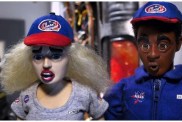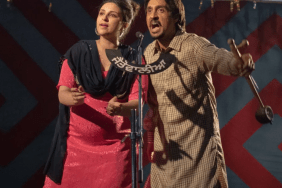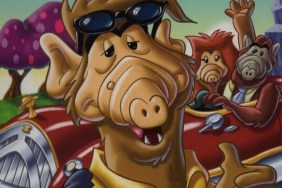It’s been ten years since legendary filmmaker Francis Ford Coppola graced the silver screen after helming some true film classics like “The Godfather” trilogy and Apocalypse Now, but his new film Youth Without Youth might seem like a daring move and possibly the least commercial film of Coppola’s long career. Based on the metaphysical writings of Romanian philosopher Mircea Eliade, the film follows Tim Roth as 70-year-old linguistics professor Dominic Matei, a man haunted by his lost love Lara while languishing in Bucharest, and after being struck by lightning, he goes through a process of rejuvenation that reverts his body back to that of a 40-year-old. Things get even more interesting when he meets the beautiful Veronica (Alexandra Maria Lara from Downfall) who is the spitting image of his ex and channels an ancient spirit named “Rupini” while speaking in ancient tongues. (It’s probably mind-blowing stuff for those who are able to get it.)
While Coppola’s production on the film traversed the globe from Romania to Geneva to Malta and India, ComingSoon.net had a chance to grab some time with Mr. Coppola during a stop in New York, before he returned to South America to continue filming his next movie Tetro.
ComingSoon.net: Do you think you would have done this movie when you were younger?
Francis Ford Coppola: No one has asked me that question. I think yes. I think the Twilight Zone aspect would have appealed to me. That kind of metaphysical, Faustian parallel, you know? I was a theater student of course. The real career I had in mind perhaps was more… did you ever see a film I made “The Rainmaker”? It was more personal stories. I was a theater student of the days of Kazan, Brando, and Tennessee Williams being the gods as they still are in my mind, so I would’ve loved to continue in that kind of career, but “Youth Without Youth” would’ve intrigued me I think because of the hocus pocus. One of the great things of making movies is you tend to learn a lot about that subject matter. You’re making a film about the Vietnamese War, you read a lot about it. Mircea Eliade, man he was really more of a philosopher of religion, but he wrote these stories to entertain himself to play around with things he was deriving out of, Hindu, early Buddhist because he was a “Sanscritist” and he specialized in India, but in Oriental religion. So he wrote these fables to play around with the ideas that he was doing in his work.
CS: How long ago did you originally read his novella? Were you aware it was going to be a challenge from the beginning and how did you approach that challenge?
Coppola: I was working on this project which you’ve heard of which was “Megalopolis.” When I got myself out of debt around the time of “Dracula,” I don’t know how old I was, I was in my late fifties or something. After ten years from age forty to fifty of just making a film every year–because I had this enormous bank payment to make–I said, “Well now I’m going to use all I’ve learned and write a great screenplay and it’s going to be big, and I know people would like something erratic from me.” So I cooked up this “Megalopolis” as an original screenplay. I got time, it could take years to do it. Maybe that’s not best to have years to do it because it took years. Ultimately, it was a movie in a nutshell about a utopia. The idea that maybe the human species is so talented and so ingenious that we could at this point build life in the world that would be so exciting and great for everybody. I set the story in New York and it had a kind of archetype of master builder, like a Robert Moses, but an enlightened kind of character and it was all on grandiose terms. Right in the middle of it, we were shooting in fact the second unit, and right in the middle of it the Twin Towers tragedy took place. Suddenly I was thinking, “Well how do I deal with this?” because it changed for good the idea of any story you might set in New York in contemporary time. Everyone knew the mayor and the circumstances, so I basically couldn’t figure out how to write my way out of it. I even have footage. Have any of you seen that movie, the documentary made called “Coda” about the making of “Youth Without Youth”? It has footage from “Megalopolis” when we were shooting. We actually shot there two days after the tragedy.

What happened is I didn’t know what to do. I was working on this and my feeling was that it would be Christmas, I would see my kids and New Year’s. The next thing I know it was July and I wasn’t any closer. Two or three years just went by like that and you know, I was frustrated. I’ve said this but it was misunderstood is that I wanted my place in the movie world, not my place in history, but just like what kind of movies could I work on? I didn’t want to do jobs anymore because I had done ten years of that. I felt the big movies that could afford to hire a regular director were getting more and more… you’d seen them already. The little independent films, which were and still are the exciting films, even that was getting hard, so I kind of didn’t know what to do in a way.
I felt pretty vigorous and I was sixty-five, but I didn’t know exactly how to function given what was changing in the movie business. Finally, I was working on this “Megalopolis” script and it dealt with time in a funny way because obviously when you are going to build a utopia, it doesn’t happen in a weekend. A friend of mine gave me this Mircea Eliade story because it had some very interesting quotes. First I read the quotes about time because time is essentially unreal. The future doesn’t exist. It is the present and that’s all that there is. We as humans can think about the future as a concept, but there is no such thing as the future nor is there such a thing as the past, because we are always in the present. At any rate, I read these and thought, “Oh that’s very interesting.” Then I just got the story just to read the story. When I read the story I thought, “Wow, this is like a hell of a story. Every two pages something really strange happens.” It’s a real trip. It’s like an intellectual Twilight Zone. Along the way, you’re learning about things I didn’t know about from Indian myth and stuff like that. I just found it interesting and I became enthusiastic and since I had a lot of money, I went off and made a movie and paid for it myself.
CS: Could you talk about casting Tim Roth? I’m curious what you saw in him as far as playing the role of an everyman?
Coppola: I cast Tim Roth because I wanted to cast an actor who would go with me and freeze in Romania for six months for not a ton of money which I didn’t have. Also, I wanted to cast someone that I’d always liked in films and felt he’d never gotten a day in the sun. I think Tim Roth is someone we’ve seen as villains and he’s clearly a very bright guy, and a very talented guy, very bright, and very savvy about movies. I wanted someone who hadn’t gotten the chance to be the star above the title and to be the romance and to play old and play young. Playing young is really hard. It’s not so hard to take a 45-year-old guy and make him eighty years old, but to take a 45-year-old guy and make him be vaguely believable as a 24-year-old guy is very hard. He had lots of challenges and he was very good to give me his time. I remember when my nephew Nicolas had made so many movies, but finally after, I don’t know how many films, he did “Leaving Las Vegas” after being wonderful in a dozen films, finally they all said, “Oh, look at Nicolas.” Obviously, you hope that the actor you can afford to have with you would get that kind of chance at being celebrated.
CS: Can you talk about working in Bucharest and recreating the city pre-Ceauşescu?
Coppola: The beauty of Ceauşescu is that he didn’t destroy the entire city although he came darn close and that’s unforgivable because it was always a beautiful city. Intellectually, Romania is very vital, with great composers, poets, and great theater. So I went with the attitude, you know I’m a Roger Corman trained filmmaker, so I know the most expensive thing on a movie when you really get down to it are plane tickets, hotel rooms, transportation, and meals. So I said, “I’m gonna go there alone,” which I did. “And pick everyone from Romania. Because then I don’t have to fly anyone there.” If I brought along a standing photographer or something like that, then they’d want their camera operator, they’d want their gaffer, and the gaffer has to have so and so and the thing just balloons into plane tickets and hotel bills. So I went and said, “I’m going to pick everyone just from the young Romanian people I met.” I say young because anyone from Romania under thirty-five spoke English. I was very happy because I picked a twenty-nine year old cinematographer who was just fabulous to work with, a sweet young man, very serious. You don’t know when you see the movie, I’m expecting you don’t know how it was made, whether it was digital, film, or what because of these beautiful images. And of course it was shot digitally.

CS: In the notes it says that “Youth Without Youth” is at once a poignant love story, political thriller and a lively philosophical quest, but I also saw elements of horror and science fiction in there. Can you talk about that?
Coppola: Of course I have a great affection for the horror movie because the horror movie was always the friend to the young filmmaker, because you could make it and somebody would give you the money because they’d get it back. Also, a horror movie allows you to have style in the film. You could do something a little far-out, so it’s a very forgiving genre. It’s the only thing you can do when you’re young often. That’s why we all started with Roger Corman. But certainly, this has elements of that as well, and I think Eliade was having fun with it. As I said, it was fun for him. If you’ve read his other stories, they’re quite remarkable, and they all take elements from his serious work. Indian myth is really where all of our traditions of Aesop’s Fables. They all come from Indian traditions, but they are all little exercises to show how perception isn’t quite what you think and time isn’t quite what you think. They’re all little fables that are very similar to “Youth Without Youth” really in a way which is where he got it from.
CS: Could you talk about one of the themes of the movie which is that “Love is stronger than knowledge”?
Coppola: Love is stronger than knowledge. That’s a very interesting statement. For human beings, knowledge is pretty intoxicating, but love seems to be the thing that we get our definition from. I can understand his decision. Imagine being with a beautiful young woman. I love the irony in the story, of he was old getting young and she was young getting old. It is full of science fiction, you are quite right. For me, the theme was very much like a Faustian story. He had always been a bookish man, and here he was getting increased intellectualism and speaking languages he couldn’t speak, but when you are able to love a second time, that’s got to be the ultimate dream. Why would anyone want to be young again if not (for) that?
(SPOILER WARNING!!!!!)
At the end of the piece it came down to, ironically, he had been given this opportunity to go back to the origins of language which is what he always wanted, even as a young man. If you recall when he was talking to his professor, he said he wanted to get at that moment when human beings first spoke because he thought that was the beginning of consciousness. Through the gift of this far-out story of this girl existing on another life as the Indian woman, she’s taking him back to the moment when humans first spoke. He realizes that she’s becoming ravaged and losing her health and her beauty, not willing to lose his love a second time, he sacrifices himself and doesn’t ever get back to the origins of language where she was taking him.
(SPOILER WARNING OVER)
CS: You’ve mentioned that you have an admiration for Japanese director Ozu, so did you decide to use some of his techniques in this film?
Coppola: There are many great Japanese directors, but yes, when I made movies before, I would always experiment with the style because I wanted to learn about it, but also I feel the style should be chosen based on the theme. I made films with moving camera. “Apocalypse Now” is moving camera. I’m now at an age where I kind of want to harvest what I’ve experimented with all those years. I have to say that I prefer the cinematic style without the moving camera because when the frame is static, all the movement is accentuated. When people make an entrance, or go out, or come in, and also the structure of the shots. Every shot you cut to brings more information. A lot of times you’re shooting, and okay she’s over there and she gets up and she walks up over there and I started to find that every shot has all the information in it and it’s hard to cut it. You have to choose, “Well do I use the shot where she is over here with him? That wasn’t even such a great shot because we were just at the tail end. Or do I use the one that was set up?” And I’ve now come to wanting to have every shot set-up and know if she were to get up, I wouldn’t tilt up with her, I would let her go out of frame and get another shot so I’m not looking up her nose. A lot of things like that.

CS: You’ve done big films that have gone over-budget and movies on a tighter budget. There are filmmakers who feel that limits, whether they be financial or artistic, are actually good for creativity, and other people who chafe at that idea.
Coppola: In a way it’s the same thing as the limit of not moving the camera… I only went over-budget on movies that I was financing. I was always pretty savvy on production and I never went over budget, well “Cotton Club” I went over budget, but that was such an interesting experience. But no, I’m capable of making a movie modestly, and in fact, on “Youth Without Youth” it was my money. It wasn’t a little movie. We had period costumes, we had Nazis, we had India, we had all kinds of stuff. I did a good job on making the money count.
CS: Can you talk about your next movie “Tetro”?
Coppola: “Tetro” is starting right away. It’s the guy’s name and it’s another personal film. This movie was the bridge for me. “Tetro” is more like the film after “The Conversation”. That was the kind of career I was going for, “Rainmaker,” “The Conversation.” “Youth Without Youth” had always been a strange episode because it’s such a strange story, but “Tetro” is more my Tennessee Williams drama of my own life. Not autobiographical, but certainly themes that were present in my own life.
CS: Would you consider “Youth Without Youth” autobiographical?
Coppola: Only to the extent where I said, “Oh, here I am and I want to have a career like an eighteen-year-old and make experimental movies. If I get hit by lightning, maybe I can go do that.” So to an extent, it was more that I saw the parallel and said, “Well that’s a good sign. That tells me I ought to go make it.” People will say it had to do something with me personally.
Youth Without Youth opens in New York and Los Angeles on Friday, December 14.









